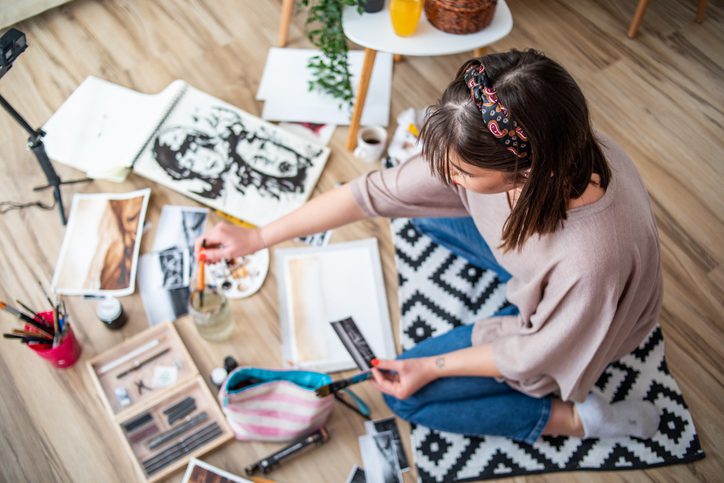Addiction recovery is not just about abstaining from substances; it’s about rebuilding your life, addressing underlying issues, and creating a sustainable foundation for overall well-being. A powerful tool for well-being that is often overlooked is creativity. Engaging in creative pursuits provides a positive outlet for your emotions and fosters a sense of self-discovery and personal growth.
Creative expression can play a crucial role in the recovery process by offering a means of self-reflection and coping. It helps you channel your energy into something positive and constructive. It allows you to express your thoughts, feelings, and experiences without judgment.
Benefits of Creativity in Recovery
There are endless ways to be creative. Whether through art, writing, music, or dance, being creative allows you to release pent-up emotions and gain a deeper understanding of your inner self. Creative endeavors can help you:
- Rebuild Your Identity: Addiction often erodes a person’s sense of self, leaving behind a fragmented identity. Creativity becomes a powerful tool for rebuilding this identity. Engaging in creative activities allows you to explore new facets of yourself, discover hidden talents, and redefine your self-concept. Whether picking up a paintbrush, learning a musical instrument, or trying out new writing styles, creative pursuits contribute to a sense of accomplishment and empowerment, fostering a positive self-image crucial for recovery.
- Stay Present: Creativity offers a unique form of mindfulness where you can immerse yourself in the present moment, fully absorbed in the creative process. This immersion distracts from cravings and negative thoughts, redirecting your focus toward positive and fulfilling activities. Whether it’s sculpting, gardening, or cooking, the act of creating becomes a mindful practice that enhances self-awareness and reduces the allure of addictive behaviors.
- Reduce Stress: Being creative is a great way to reduce stress. Reducing stress promotes emotional well-being and can reduce cravings for alcohol or drugs. Immersing yourself in painting or drawing or simply listening to a favorite song can help you escape from negativity and stress and focus on the beauty you are about to create.
Examples of Creative Practices in Recovery
Incorporating creative practices into your life can unlock new dimensions of self-discovery, resilience, and joy. If you are unsure where to start expressing your creativity, consider the following:
- Art Therapy: Engaging in art therapy can be a transformative experience. Painting, drawing, or sculpting allows you to externalize your emotions, providing a tangible representation of your journey. Art therapy is widely used in recovery programs, encouraging individuals to explore and communicate their emotions through visual mediums.
- Writing and Journaling: Keeping a journal or engaging in creative writing provides an avenue for introspection and self-discovery. Writing allows individuals to process their experiences, set goals, and celebrate milestones. Poetry, short stories, or personal narratives become powerful tools for self-expression and reflection. You do not have to be a professional writer to benefit from this form of expression.
- Music as Therapy: Learning to play a musical instrument or simply listening to music can have profound effects on emotional well-being. Music has the power to evoke emotions, memories, and inspiration. It can be used as a tool for self-expression or as a therapeutic outlet for emotional release.
- Dance: Dance is a holistic form of self-expression that integrates the mind and body. Whether through formal dance classes or free-form movement, dance provides an outlet for emotional expression, stress relief, and physical exercise. It can also be a group activity, fostering a sense of connection with others. If you are not into sharing your dance skills, simply turn on some music and dance in your home.
- Cooking or baking: Exploring creativity in the kitchen can be a therapeutic and rewarding experience. Cooking or baking allows individuals to engage in a mindful and sensory-rich activity. The process of creating a meal combines various elements to produce a positive outcome, much like the journey of recovery. Invite over some friends and family and enjoy a meal together.
If you or a loved one are struggling with a substance use disorder, we can help. At Twin Lakes Recovery Center in Monroe, Georgia, we can put you on the path to a lasting recovery. To learn more about our programs and services, please contact us today.




